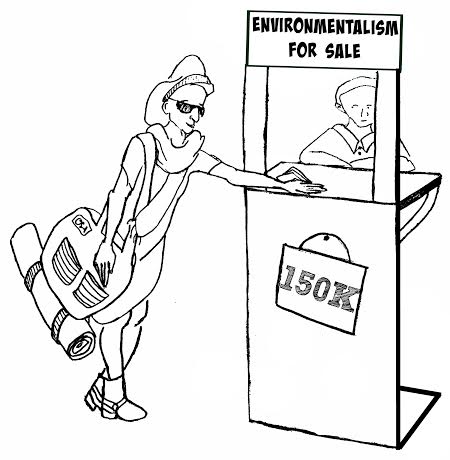UPDATE: This article spurred a conversation between its author, elephant journal editor Caroline Beaton, and MSNBC’s Tony Dokoupil on the web series “Greenhouse.” Watch it below:
Environmentalism: only a ‘first world’ problem?
This is a test. Check all that apply. Do you:
- Walk or bike to work?
- Buy organic and/or local?
- Eat sustainable seafood, fruit and grains?
- Wear clothes not manufactured in a sweatshop?
- Garden?
- Acquire power from the sun or the wind?
- Drive a hybrid, electric or fuel-efficient vehicle?
- Have efficient heating, cooling and/or water systems?
If you answered “yes” to some or all of the above, congratulations: You care about the environment, and you have money! If you didn’t, you’d have more immediate concerns, like getting to work at all and affording CO2-flooding-factory-made chicken nuggets.
Life problems and eco-friendliness aren’t mutually exclusive, but financial hardship and at-home environmentalism may be.
Historically, the poor were inadvertently the population living most sustainably. Out of financial necessity, they recycled and reused when possible, lived in urban close-quarters and avoided spending money, and therefore resources, on utilities, food, transportation, consumer goods, technology and the like.
Since becoming fashionable, sustainability has acquired a new definition and demographic. Modern environmentalism is now characterized not by restricting intake but by the consumer effects of greenwashing, whereby shoppers purchase allegedly environmentally-conscious products that cost more. As consequence, eco-friendliness has become a feel-good commodity uniquely accessible to those with ample means.
In Globalization, economist Donald Boudreaux writes, “Environmental quality is very much like leisure time: as people become wealthier they demand more of it, mostly because they can better afford it.” Statistics support the notion that environmentalism is predominately accessed and ordered by the rich: according to a new study by the Scarborough Research Center, consumers who engage in the highest amount of environmentally friendly activities are significantly more likely to earn above $150K per year.
“Today’s environmentalists have traded sandals and hemp for cashmere and a Lexus,” said Scarborough Research Center VP of Marketing.
From ethically-sourced jewelry and sustainable clothing to bamboo flooring and biodegradable coffins, eco-products compose one of the fastest growing industries in the nation. But inflated prices (due to popularity but also higher cost of manufacturing environmentally-sensitive products) also make it a difficult industry to, literally, buy into for lower income brackets. Meanwhile, foreign mass-production dictates that the cheapest products are manufactured in the most environmentally detrimental ways. Thus the barrier to entry of environmentalism is not morals but price, so that ethical shopping has come to resemble a status symbol.
Access to pricey environmentally conscious products in addition to transportation, education and time to comparison-shop makes practicing in-store environmentalism measurably easier for the wealthy. But the actual impact of eco-consumerism is debated. While Forbes opines that one of the most “meaningful ways for the public to converse with industry is by altering their shopping patterns,” The Guardian asserts that “No political challenge can be met by shopping.”
Regardless, certainly not all environmentalism is consumer based. Other measures of modern conservation championed by the rich benefit not only their social status and conscience but also quantifiable measures of preservation. However, these practices to mitigate daily footprint – such as buying efficient, urban residences, minimizing commutes and voting in support of the environment – are increasingly impractical for the poor.
When environmentalism became popular, the rich began to gentrify urban areas previously inhabited by lower income populations. As consequence, poverty migrated to the suburbs, where cost of living is cheaper but environmental impact greater. Massive developments threaten land and wildlife while commuting and sprawling, cheaply-built homes waste finite resources.
While the wealthy brag about biking to work, the not-so-wealthy suffer hour-plus commutes in inefficient cars. The eco-rich who do drive buy electrics or hybrids. Asking the poor to shorten their commute or use less gas is like asking women to use as little toilet paper as men; circumstances dictate eco-friendliness first and foremost.
It’s no surprise that the most environmentally-friendly cities in the world, such as Vancouver, San Francisco and Sydney, are also the most expensive. The result of the low-income urban exodus is that the blame, guilt and cost of suburban squandering rests on the poor.
While the eco-rich flock to the cities, they re-connect to the earth by way of rural second home.”You can save the planet from your own kitchen,” says The Guardian, “if you have endless time and plenty of land.” In the UK, second-home farm prices have skyrocketed. This faux-environmentalism-by-whim of the rich has estranged those who depended on farming for a living from their homes and jobs.
Aside from at-home environmentalism, the rich can afford to support state and federal policies favoring the environment without considering personal financial impact. For example, a Pew Research Center Poll found that two major voting groups oppose the Keystone XL pipeline: Democrats who make more than $100K annually and Democrats with college or advanced degrees. Vast environmental implications aside, constructing the Keystone XL pipeline would tangibly benefit the poor, who at present can’t afford gas accrued by lengthy commutes and old cars.
While the poor are understandably more concerned with job creation and saving gas money than saving the planet, the rich can deride from a distance anyone in favor of Keystone XL’s construction.
Passing the eco-friendly test is a feat well modeled by the rich. While some eco-activities are admittedly superficial, contradictory or have little real impact on the environment, the growing popularity of environmentalism is by and large a good thing. But it remains cost prohibitive for the poor. The paradox is that the trendier environmentally-friendly activities become, the more expensive it is for the non-rich majority to partake. Consequently, we’re less effective as a whole in reducing damage to the environment.
Our duty as citizens who pass the test with flying colors is not to excuse those who can’t but to devise mandatory but fair methods of equal participation and accountability.
Instead of heavy gas taxes that make the poor poorer, we need to increase public transportation, find financially viable fuel alternatives and require efficiency in new developments; instead of labeling or certifying eco-products, which will only increase eco-product premiums and therefore the eco-wealth disparity, we need to set a higher environmental standard for all products that hit the market.
Despite the short-term feel-good of enabling a system of environment-conscious superiority, the fight for the environment hinges on integrating lower classes into our practices: we win it only with them.
Love elephant and want to go steady?
Sign up for our (curated) daily and weekly newsletters!
Author: Caroline Beaton
Editor: Renée Picard
Photo: Illustration by Caroline Beaton


 Share on bsky
Share on bsky





Read 9 comments and reply